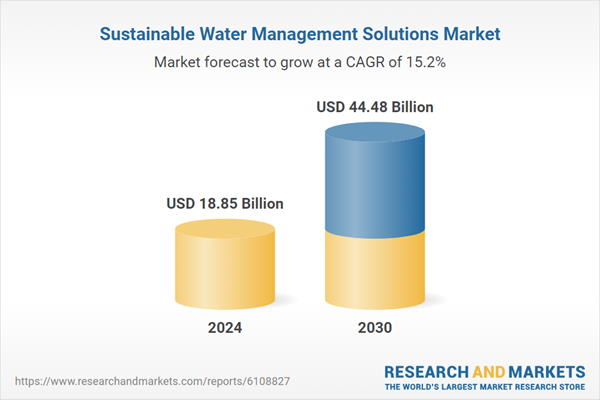Speak directly to the analyst to clarify any post sales queries you may have.
10% Free customizationThis report comes with 10% free customization, enabling you to add data that meets your specific business needs.
These solutions are essential in preserving water resources and ensuring long-term supply amid growing urban populations, climate change, and industrial demand. Government initiatives, sustainability mandates, and digital transformation in utilities are further accelerating investment in modern, data-driven infrastructure for water conservation and quality monitoring. Industrial users are also increasingly deploying zero-liquid discharge systems and closed-loop water cycles to reduce consumption and comply with stringent environmental norms.
Key Market Drivers
Rising Water Scarcity and Demand-Supply Imbalance
The global surge in water stress is a major driver propelling the demand for sustainable water management solutions. Freshwater resources are becoming increasingly strained due to population growth, climate variability, and pollution. According to the UN, more than 2.3 billion people live in water-stressed regions, a number expected to rise sharply. With agriculture accounting for 70% of global freshwater use, followed by industrial and residential sectors, the gap between demand and supply continues to widen. As urbanization and industrial activity increase, the global water demand is forecasted to grow by over 55% by 2050. Regions such as the Middle East, South Asia, and parts of Sub-Saharan Africa are already experiencing critical water shortages. To address these challenges, governments and industries are implementing measures such as water reuse, smart irrigation, and resource-efficient systems aimed at reducing dependency on conventional freshwater sources.Key Market Challenges
High Capital Investment and Long Payback Period
The adoption of sustainable water management technologies faces hurdles due to high initial investment requirements. Implementing advanced solutions like smart meters, IoT-enabled monitoring tools, and wastewater recycling systems involves significant capital expenditure. This presents a particular challenge for small municipalities, developing economies, and budget-constrained utilities. For instance, establishing a zero-liquid discharge system in an industrial facility can require multimillion-dollar investments, with returns realized only over a 5 to 10-year period. Additionally, costs associated with skilled labor, system integration, and ongoing maintenance add to the financial burden. These high entry barriers often limit deployment, especially in regions lacking institutional funding or government subsidies.Key Market Trends
Rise of Decentralized and Modular Water Systems
A key trend in the market is the growing use of decentralized and modular water treatment systems, especially in locations with limited or aging centralized infrastructure. These compact and scalable systems can be installed close to the point of use, improving efficiency and reducing transmission losses. They are increasingly being adopted in rural communities, industrial parks, and disaster-prone zones.For example, containerized membrane bioreactors and packaged treatment units are enabling localized water reuse in agriculture, sanitation, and cooling operations. Some systems now operate on solar energy, supporting sustainable water access in off-grid areas. Government initiatives such as India’s Swachh Bharat Mission and decentralized water kiosks in Sub-Saharan Africa reflect this growing trend. In drought-affected regions like California, localized greywater recycling and rainwater harvesting systems are becoming viable options for residential and commercial applications.
Key Market Players
- Veolia Environnement
- SUEZ
- Xylem Inc.
- Ecolab Inc.
- AECOM
- Badger Meter Inc.
- Itron Inc.
- Grundfos
- Kurita Water Industries Ltd.
- Aquatech International LLC
Report Scope:
In this report, the Global Sustainable Water Management Solutions Market has been segmented into the following categories, in addition to the industry trends which have also been detailed below:Sustainable Water Management Solutions Market, By Component:
- Hardware
- Software
- Services
Sustainable Water Management Solutions Market, By Solution Type:
- Water Conservation Solutions
- Water Recycling & Reuse Solutions
- Rainwater Harvesting Systems
- Water Treatment Technologies
- Others
Sustainable Water Management Solutions Market, By End-User:
- Utilities
- Industrial
- Residential
- Commercial
Sustainable Water Management Solutions Market, By Region:
- North America
- United States
- Canada
- Mexico
- Europe
- Germany
- France
- United Kingdom
- Italy
- Spain
- South America
- Brazil
- Argentina
- Colombia
- Asia-Pacific
- China
- India
- Japan
- South Korea
- Australia
- Middle East & Africa
- Saudi Arabia
- UAE
- South Africa
Competitive Landscape
Company Profiles: Detailed analysis of the major companies present in the Global Sustainable Water Management Solutions Market.Available Customizations:
With the given market data, the publisher offers customizations according to a company's specific needs. The following customization options are available for the report.Company Information
- Detailed analysis and profiling of additional market players (up to five).
This product will be delivered within 1-3 business days.
Table of Contents
Companies Mentioned
- Veolia Environnement
- SUEZ
- Xylem Inc.
- Ecolab Inc.
- AECOM
- Badger Meter Inc.
- Itron Inc.
- Grundfos
- Kurita Water Industries Ltd.
- Aquatech International LLC
Table Information
| Report Attribute | Details |
|---|---|
| No. of Pages | 185 |
| Published | July 2025 |
| Forecast Period | 2024 - 2030 |
| Estimated Market Value ( USD | $ 18.85 Billion |
| Forecasted Market Value ( USD | $ 44.48 Billion |
| Compound Annual Growth Rate | 15.2% |
| Regions Covered | Global |
| No. of Companies Mentioned | 10 |









